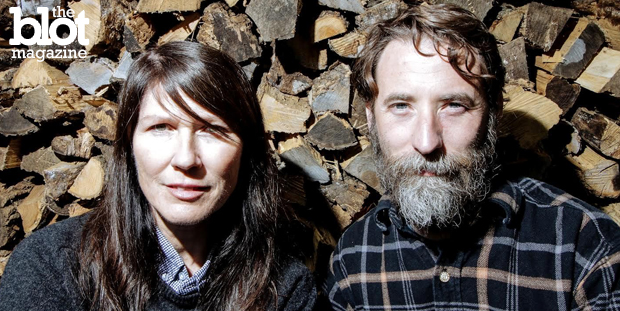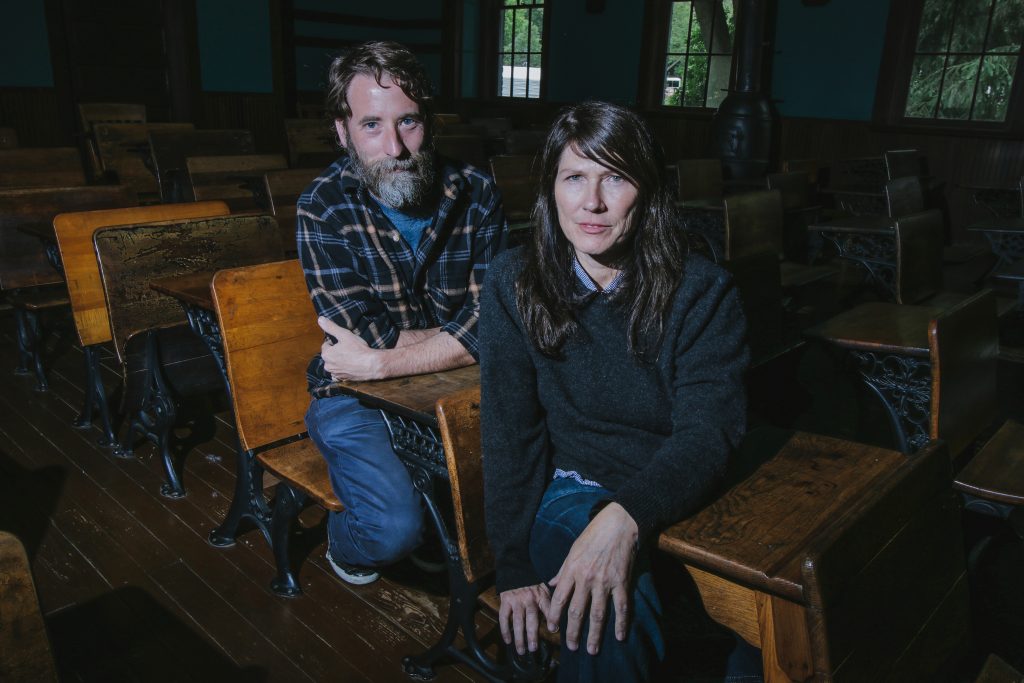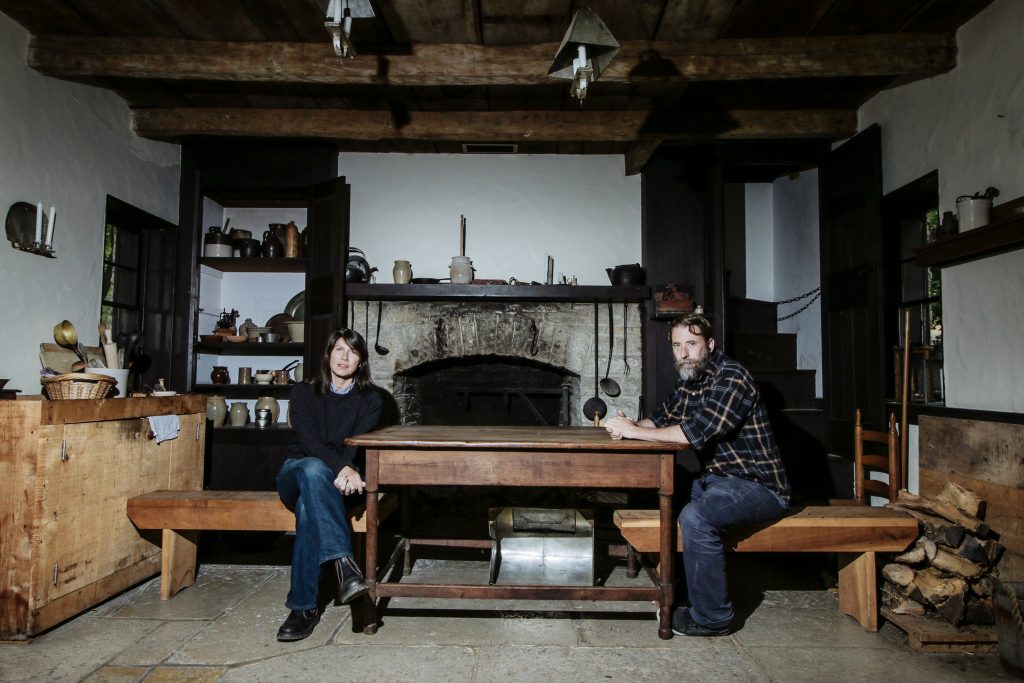Kelley Deal debuted in the early 1990s as lead guitarist for her twin sister Kim’s band, the Breeders. Although she was a complete beginner on the instrument, Kelley played on the Breeders’ acclaimed 1993 album “Last Splash,” which featured the delightfully fizzy hit “Cannonball.”
The decade was the beginning of Kelley Deal’s musical career. After kicking a drug habit, she formed her own band, The Kelley Deal 6000, in 1995. The band went on to release two albums before disbanding in 1997.
Most recently, Deal teamed up with Mike Montgomery of Ampline to form the duo R. Ring, which will play Johnny Brenda’s in Philadelphia Monday, July 27 and The Bell House in Brooklyn Friday, July 31. TheBlot Magazine spoke her about R. Ring, her younger days behind the drum kit, and, of course, the future of the Breeders.
Can you give me a little background on your current project, R. Ring?
OK, well, I met [Mike Montgomery] through some mutual musicians from Ohio. We were doing a song for a Guided by Voices tribute record. And I was asked to join that, so I needed a band. I asked a local band called Buffalo Killers, and we recorded at a studio called Candyland, which is in Cincinnati. And through that project, I met my buddy, Mike Montgomery. He was a really nice guy. I liked the sounds he was getting. I liked the decisions he made. … And he was invited to do something, and I joined him, and we just started doing that. It happened really thoroughly and organically, and it kind of still is.
How would you describe the music you’re making together?
Well, I was talking to someone yesterday, and they said, “Sounds like …” God, what did he say? I think I wrote it down because I thought, “Oh, that is so funny.” It’s right here. He said it sounded like “the Dead Boys meets Eric Carmen.”
Dead Boys meets Eric Carmen, that’s actually pretty wonderful. The Dead Boys have a connection to Ohio. You’re from there, and it doesn’t seem to get as many props as it should for its music scene considering it has Rocket from the Tombs and Guided by Voices.
… and Devo and The Black Keys and Chrissie Hynde and Lou Barlow and The Breeders and Brainiac. It’s just a ton of bands. And not to mention the funk bands like Ohio Players, Slave.
When the Breeders first began, there was a lot of talk about how you had just started playing the guitar. Had you played any music at all before you joined?
Well, it’s interesting because I started with the drums when I was in third grade. And I played the drums all the way up through high school. And even took drum lessons and everything. So that’s what my first experience was, through drums, with music.
And then, of course, I saw “The Song Remains the Same,” that Led Zeppelin movie, you know? And just went, “Oh my God! I want to play lead guitar!” And I just thought it was the best thing ever, so that really got me into making music, creating, writing music — which, as a drummer, I never thought about, the creation of it. I just thought about the drum parts.
And it was then when I fell in love with what music. How crazy it could be, how unique. The boundaries that I thought were music were very different, more pop.
What about being a girl drummer back then? It was basically an anomaly unless you were talking about Maureen Tucker of the Velvet Underground or Sandy West from the Runaways.
At that time, I’d never heard of either of those bands. The only band that I had heard of when I started playing drums, the only girl drummer, was Karen Carpenter. And I saw her playing it. And that’s probably why I picked it. “Karen Carpenter plays drums,” you know?
You know what I really love about that, too, especially Mo Tucker, is that she was such an amateur. She didn’t actually know how to play the drums. And played it really unusually. I really love that element of having a novice or somebody who doesn’t think like a regular musician. Once you learn all those pro-blues riffs and those heavy-metal scales, you start to riff. I feel like that’s one of the reasons I never learned how to do that. Because I know me. And I will throw that riff! I just will!
From what I understand, while your sister Kim was in the Pixies, you were working with computers. Were you playing music as a hobby?
It’s interesting, because when she answered an ad, and Charles [Thompson, aka Pixies frontman Frank Black/Black Francis] and her, they split an airplane ticket for me to fly from Dayton, Ohio, to Boston so that I could meet Charles. They wanted me to play drums for them. It was just really funny when I think about it. I’m really glad I said, “No, I don’t think so.” Because they were wonderful and really talented. And they needed a real drummer.
Drums is not something that you can stay away from for, God, was that seven years at that time or something? And just kind of sit down on a stool. So I’m really glad that I said no. Even though that kind of contradicts what I just said about Mo Tucker. Maybe I should have said yes!
What about when Kim invited you to join the Breeders? Were you nervous? The drummer, of course, is behind everyone else, but a guitarist is right up front. What was that experience like?
Well, with not only the instrument that I was playing but also the parts that I was playing, they were so, at least to me, maybe other people don’t hear it like I heard it, but it’s, like, it’s so unhidden. Like, if you’re playing the bass or rhythm guitar, you can kind of hit a G minor and go, “Woo-hoo!” and keep playing. Or you can make a mistake, and although it sounds very loud to your ears, a lot of people are not gonna hear it. It’s not the loudest thing in the room that you hear the mistake.
But the lead guitar? If you go to a wrong note, it is screamingly loud, so it requires some sort of perfection that I’m not actually that good at. I make a lot of mistakes. Not as many now. But back then, I was so, like, “OK. Make sure I hit notes! Make sure I hit …” That was the only thing I was thinking about at the time.
Did you ever take guitar lessons?
My first teacher was obviously a fantastic teacher, it was my sister Kim! And she taught me how to play bar chords. And that was great for a long time. I’m pretty musical. Like, if I can hum something, then I will be able to play it. I just need to practice it. I thought, “Maybe I’ll take a couple guitar lessons, see what that’s like!” And I did. I took a few. But really, the best guitar lessons are where you play with other people and learn from them. That’s really the best way to learn, to play with people who are better than you.
When did you decide to step out from the Breeders and start making music with the Kelley Deal 6000 and other projects? How did you get that confidence to do it?
I started writing some stuff after I went to rehab. I went to rehab in ’95. And once I went to rehab, then I went to a halfway house for, like, three months. It was during that time that I met other people, and I kind of started playing music with them. And right after that, once I got out and had decided to go ahead and move to St. Paul, Minn., because I dug the community and stuff, I was invited to participate in a different tribute record.
It was for a Willie Nelson tribute record, and the idea was they were inviting all different kinds of alternative and really different types of musicians and bands to cover these classic Willie Nelson songs. I was invited to cover a song called “Angels Flying Too Close to the Ground” and Kris Kristofferson joined me on that.
And that experience, just going to L.A. and being in a studio — the producer actually gave me a co-producer credit — kind of validated my opinions. It was a slow-and-steady thing, but it really gave me a lot of confidence to speak up and slowly get back into it after this debilitating year that I had had, being arrested for heroin and disappointing everybody and all this stuff. So it was a wonderful to kind of come out of it and just find my footing again. That really helped.
What was it like playing with Kris Kristofferson?
He is such a nice fella, really handsome. And he was game for anything. It was really cute, too, because my dad was so impressed. My dad and mom were so impressed that I was playing with Kris Kristofferson. And he had said to me that his kids were so impressed that he was playing with Kelley from the Breeders! I was like, “Sweet!” It was really cute that he actually knew that. Not that he dug us, necessarily, but he knew who I was from his kids. Awesome.
Tell me how you came about taking up knitting as a way to stay sober.
Sure. This was after the Kelley Deal 6000 stuff, and we were doing some touring in Europe, and it was really fun, but I found myself in Amsterdam. And this is mid-’90s, late-’90s, where there is no Internet, there is no cable, at least in Amsterdam, and I just didn’t want to read anymore. And everything on television was rugby or a Dutch program of some sort. And I’m thinking, “I’ve got to find something to do with my hands.” Everybody else went to the coffee shops in Amsterdam. I can’t go! One of the bands that we were on tour with, the girlfriend of the drummer was German, and she taught me how to knit! Like everything on the planet, I got addicted to it. But it’s a better addiction.
What is the status of the Breeders? Do you think you and Kim might make music together in the near future?
Well, [bassist] Josephine [Wiggs] is actually in town, and Kim and Jim [Macpherson, Breeders drummer] and Jo and I have been recording all week! Just kind of doing demos. Just working on music. Let me just say it like that. We’re working on music. We will always work on music.
R. Ring, Johnny Brenda’s in Philadelphia, Monday, July 27; The Bell House in Brooklyn, Friday, July 31.
Robin Cook is a contributing journalist for TheBlot Magazine.








